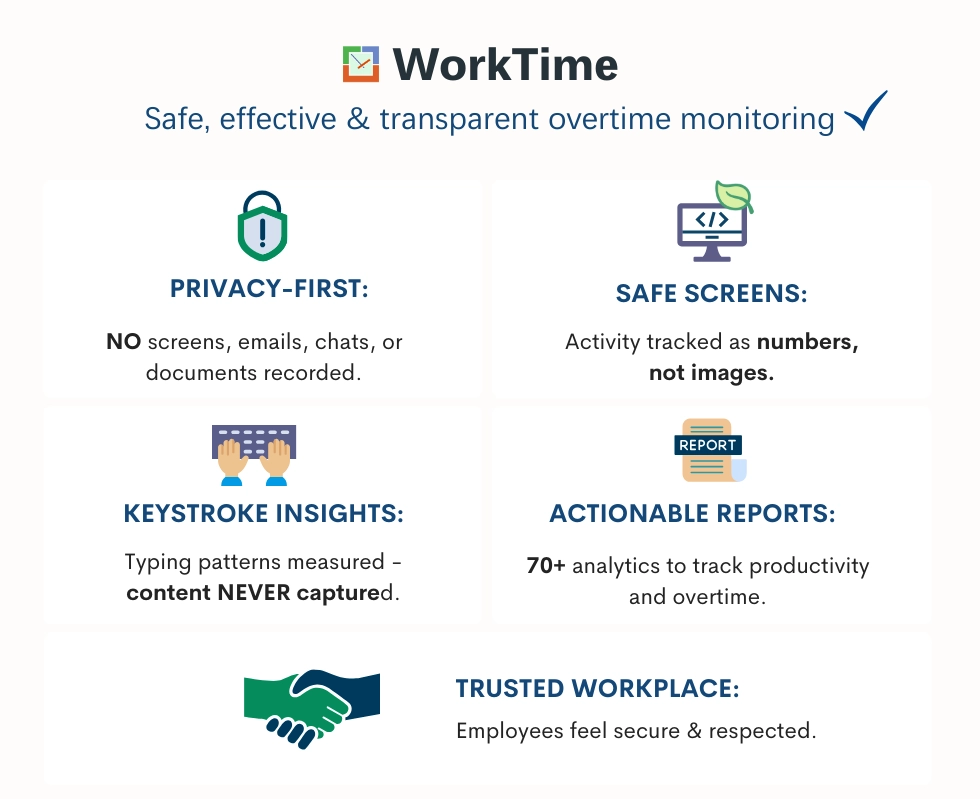Provided for you by the WorkTime team. We make overtime visible, manageable, and fair - helping businesses optimize productivity while respecting privacy.
Too much overtime? It signals these problems
Think overtime means employees are extra dedicated? Often, it doesn’t. If your team is constantly staying late, that’s not commitment - it’s a warning sign. Extra hours often hide burnout, poor planning, or mislocated tasks. You’ll never know if those extra hours mean progress without proper employee overtime monitoring. Let’s break down what’s really hiding behind excessive overtime.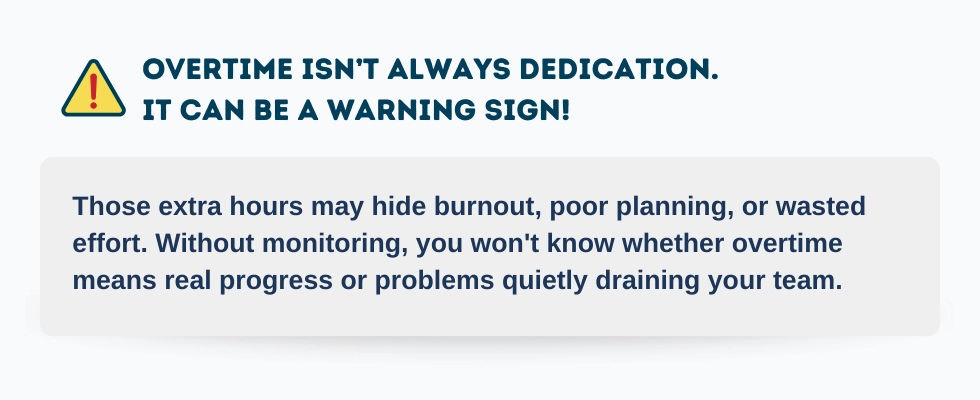
Overtime as a sign of burnout
It often starts with your most reliable employees quietly putting in extra hours. At first, it looks like dedication. But weeks later, their work slows down, mistakes appear, and enthusiasm drops. The root issue is usually burnout. Excessive overtime usually reflects exhaustion rather than productivity. It often signals gaps in processes. Over time, this shows up as- Creativity suffers. Exhausted minds can’t innovate, which slows progress and wastes opportunities.
- Team morale falls. Overloaded team members can feel frustrated, affecting overall engagement.
- Hidden mistakes escalate. Fatigue turns small errors into costly problems.
- Retention risks rise. Continuous overtime drives top talent to leave, increasing replacement costs.
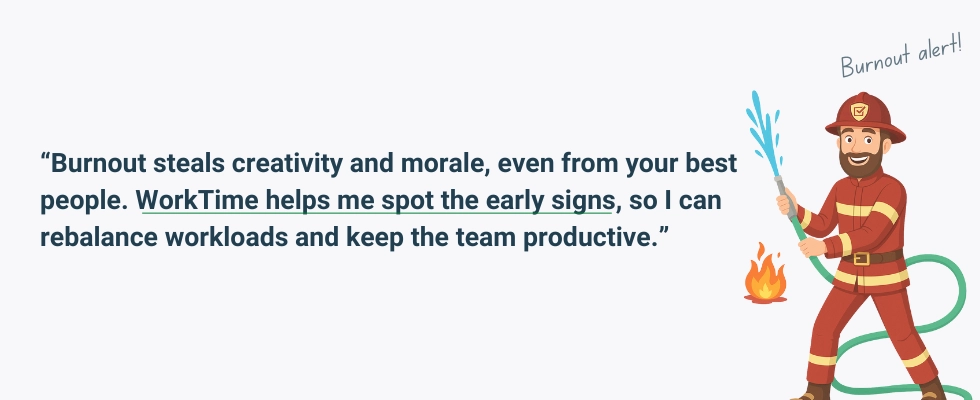
Extra hours but weak performance
Working overtime doesn’t guarantee productivity. Some employees put in extra hours but still struggle to meet goals. Imagine a developer who logs three extra hours every day for a week. By Friday, she’s exhausted and starts making repeated coding errors. The team has to spend hours fixing them. Instead of speeding up the project, the overtime actually slowed progress and raised costs.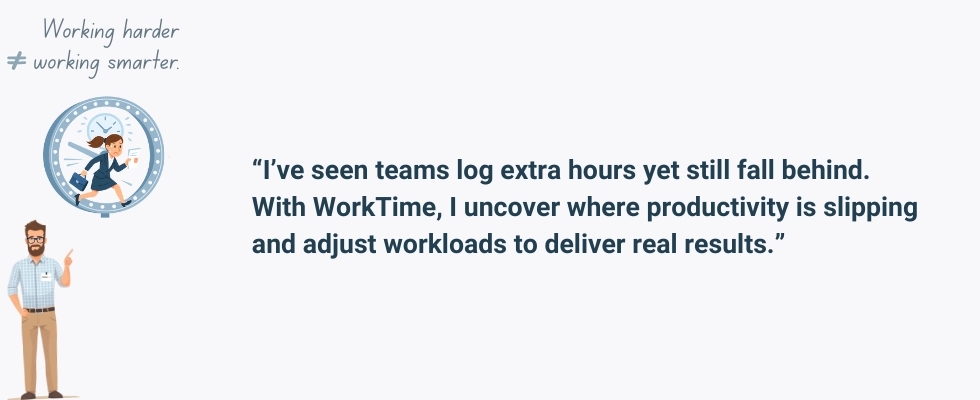
Hidden personal struggles
Sometimes, overtime isn’t about workload - it’s personal. Employees may overwork to compensate for daytime distractions or personal challenges. Without an overtime tracking system, these can quietly damage team dynamics:- Unseen struggles. Family obligations, health issues, or mental stress can push employees to work overtime to keep up. This often remains unnoticed until errors emerge.
- Quiet decline. Even with extra time, output can suffer. Fatigue and stress reduce focus, slow decision-making, and increase errors. Extra hours don’t always yield better results.
- Team imbalance. When one employee works too much to make up for gaps, it can put extra pressure on their teammates and lower the team’s morale.
Project management gaps & poor task allocation
Too much overtime often signals weak planning. Are your deadlines realistic? Do priorities shift constantly? This can push employees to work extra hours, often harming overall results. What are the risks of excessive overtime? 1. Hidden overloads. Some employees end up working overtime, while others remain underutilized. This highlights the need for employee overtime monitoring. 2. Slower decision-making. When priorities keep shifting, employees waste time seeking clarity instead of completing tasks. 3. Declining quality under pressure. When teams are racing to meet unclear deadlines, it often leads to mistakes and rework. Overtime becomes a trap instead of a boost.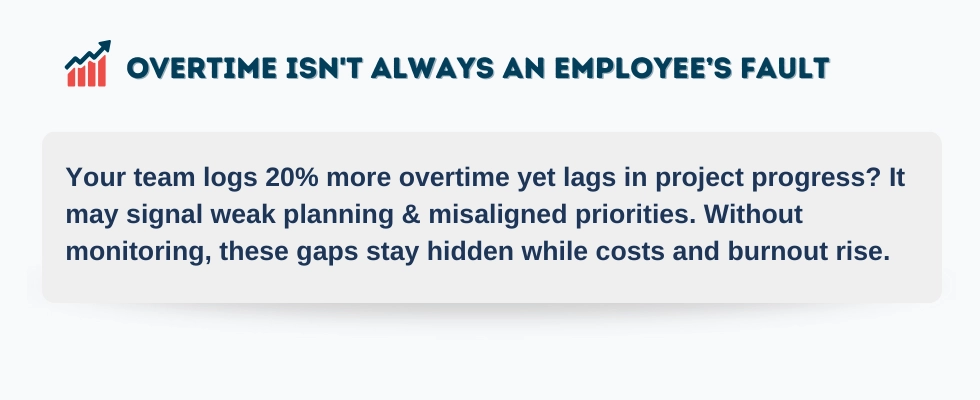
Unjustified hours, overtime fraud
What if some of those “overtime” hours you’re paying for aren’t actually justified? Employee overtime monitoring uncovers blind spots that can drain your payroll. Take one U.S. insurance company: after introducing WorkTime to investigate suspicious overtime claims, the results were shocking. Only about 10% of overtime hours were actually productive. Overtime fraud is more common than most managers think. Some employees stretch small tasks into hours, claim “project work” while browsing social media, or just log extra hours to their pay. What is the hidden cost?- Wasted payroll. Hours that don’t produce results cost your company money. Track employee work hours to prevent unnecessary payroll loss!
- Misleading performance data. Employee fraud makes it harder to spot real productivity issues.
- Broken trust. Honest employees lose confidence when others take advantage. You can easily prevent it with reliable overtime monitoring software.
Why employee overtime monitoring is a solution
All of these risks point to the same need: visibility. That’s where employee overtime monitoring becomes a powerful solution.Who’s really working - and who’s not?
See who’s actively working with WorkTime employee overtime monitoring. A “What's now?” report gives managers a real-time view of performance during extra hours. It tracks activity in a fully transparent and privacy-conscious way. No personal information is captured, so employees feel trusted.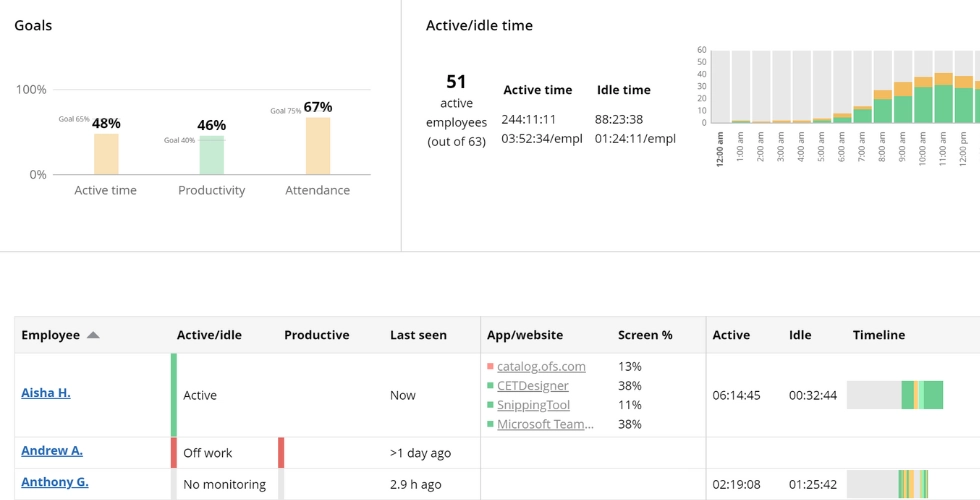

Track your team’s performance in real time. Combined with overtime monitoring, it shows whether extra hours are driving results or just wasting time & money.
Start free trialIs work done or just time logged?
Employee activity monitoring reveals active vs. idle time, application usage, and overall productivity trends. Whether your team works in-office, remotely, or in a hybrid setup, our overtime monitoring software shows who’s truly productive and who’s just logging extra hours without progress. This way, payroll isn’t wasted on unproductive overtime, and employees who put in real effort get the recognition they deserve.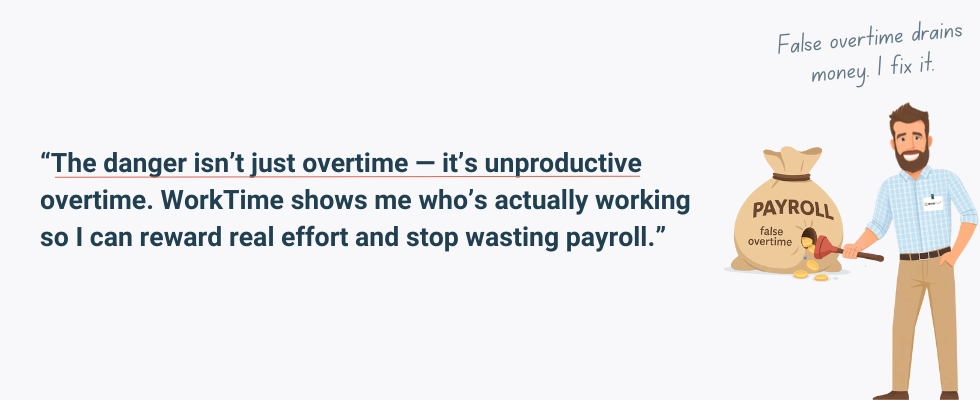
Extra hours - productive or wasted?
How do you know if overtime drives progress or just slows projects down? WorkTime employee overtime monitoring answers this question with clear, data-driven insights. Instead of intrusive screenshots, it evaluates productivity through measurable metrics: apps and websites used, internet activity, and productivity progress trends. Want to know if overtime really pays off?- Monitor employee overtime performance levels;
- Get numeric insights into productivity without invasive screenshots;
- Track long-term productivity progress across teams and projects.
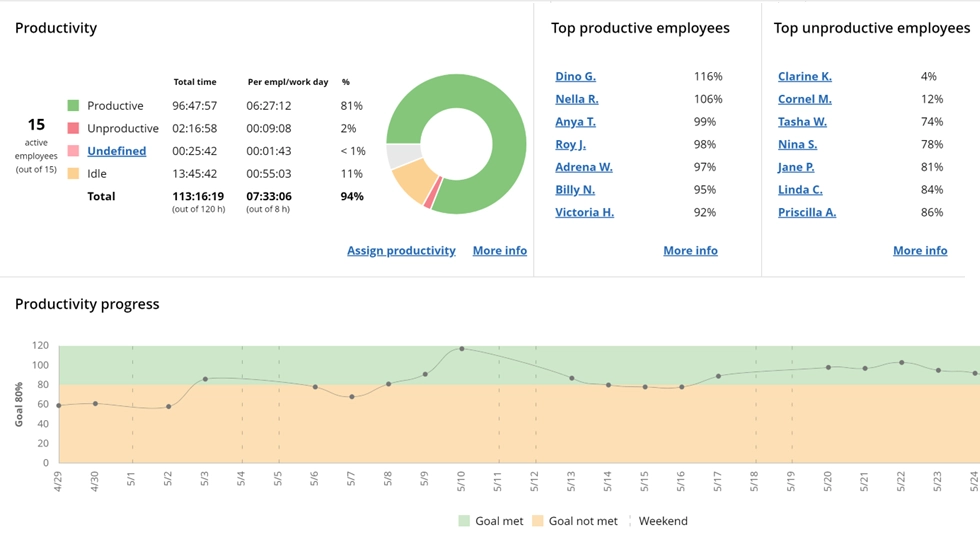

This report provides a clear view of your team’s performance. Track productivity and see if overtime really pays off!
Book demoWorkTime - transparent overtime monitoring software
Excessive overtime often hides inefficiencies, burnout, or mismanaged projects. That’s why employee overtime monitoring is essential. WorkTime makes it easy to see what’s really happening. Our non-invasive approach provides clear insights without invading employee privacy. What makes it such a game-changer?